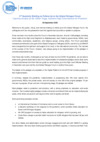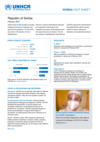16 Days Against Violence: UNHCR deeply disturbed by scale of violence against women
In 2012, some 12,000 incidents of sexual and gender-based violence were reported to UNHCR around the world, but many more cases never come forward.

Syrian refugee children attend a class in the Bekaa Valley, Lebanon. UNHCR chief António Guterres says humanitarian crises, like the conflict in Syria and Typhoon Haiyan in the Philippines, disproportionately affect children and adolescents and make them vulnerable. © UNHCR/S.Baldwin
GENEVA, November 25 (UNHCR) - UN High Commissioner for Refugees António Guterres said on Monday that the scale of sexual and gender-based violence was "deeply disturbing" despite the efforts of UNHCR and its partners to counter the "heinous" human rights abuse.
"In 2012, some 12,000 incidents were reported to UNHCR, but many more cases never come forward," Guterres said in a message to staff to mark the start of the annual 16 Days of Activism against Sexual and Gender-Based Violence.
He said that under this year's theme, "Safety in School," UNHCR aims to bring together boys and girls, teachers, parents, communities and partners to find durable and community-based solutions to prevent sexual and gender-based violence (SGBV) in school.
Guterres noted that humanitarian crises, like the conflict in Syria and Typhoon Haiyan in the Philippines, disproportionately affect children and adolescents. "Loss of family members, homes and ultimately futures, but also pre-existing gender inequalities and disruption of protective systems make boys, girls and youth extremely vulnerable to sexual and gender-based violence," he stressed.
The High Commissioner added that an estimated 60 million girls around the world are sexually assaulted on their way to school every year. Many boys and girls also face such violence in their classrooms and playgrounds. "This heinous human rights violation also carries significant human, social, and economic costs to our societies," he said.
"Recognizing the multi-faceted risks of SGBV that children and adolescents face, and the protective role education can play, UNHCR has focused in 2013 on integrating its strategies in the three core protection areas of SGBV, child protection and education," he explained. "Many operations are already developing mutually reinforcing programmes to protect girls and boys of concern from SGBV in school settings."
Guterres pledged that UNHCR, working closely with local partners and national authorities, would scale-up efforts to ensure safe learning environments, including through parent-teacher associations, youth clubs, extracurricular activities, the enforcement of codes of conduct, and confidential referral mechanisms for students to access health and psychosocial services.
"We know that by adopting a gender-sensitive approach to multisectoral services, for example by building separate latrines in schools or promoting the recruitment of female teachers among other measures, we can make girls and boys safer in school," he said.
Guterres noted that 148 UNHCR offices were implementing SGBV prevention and response programmes this year, making SGBV one of the highest selected objectives in country plans. But he added that safe learning environments "remain an under-programmed area in UNHCR operations."
UNHCR offices across the world, including the refugee agency's headquarters in Geneva, are holding events to mark the 16 Days of Activism and today's International Day to Eliminate Violence Against Women. For example, in addition to organizing cultural activities such as dancing, the UNHCR team in Burundi has also launched SGBV-related quizzes in schools as well as performances by teachers and students. Their objective is to focus on youth in order to help them understand how to prevent SGBV in schools, how to change behaviour in the long term to be more respectful of girls and women.
The 16 Days of Activism is an international campaign originating from the first Women's Global Leadership Institute in 1991. The 16 Days of Activism will run through to International Human Rights Day on December 10. It brings together UNHCR, partners, persons of concern and host communities worldwide in a united call to end sexual and gender-based violence in all its forms.
-

Bi-annual fact sheet 2021 02 Montenegro
Feb 2021 -

Bi-annual fact sheet 2021 02 Romania
Feb 2021 -

Opening Remarks by The Assistant High Commissioner for Protection
1 Feb 2021 -

Evaluation of UNHCR's L3 Emergency Response to Cyclone Idai
Feb 2021 This centralized evaluation of the United Nations High Commissioner for Refugees (UNHCR) assesses UNHCR's L3 response to Cyclones Idai and Kenneth in Mozambique, Zimbabwe and Malawi covering the period from March 2019 to May 2020 to identify lessons that can be extrapolated to other disaster responses and, with a broader perspective, to provide inputs into UNHCR's ongoing reflection about climate change and disaster induced displacement. Attachments: Executive Summary, Management Response and Annexes (.zip) -

Bi-annual fact sheet 2021 02 Liechtenstein
Feb 2021 -

Bi-annual fact sheet 2021 02 Greece
Feb 2021 -

Bi-annual fact sheet 2021 02 Austria
Feb 2021 -

Bi-annual fact sheet 2021 02 Lithuania
Feb 2021 -

Bi-annual fact sheet 2021 02 Serbia
Feb 2021
